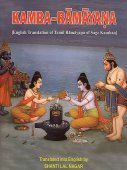Racana, Racanā: 22 definitions
Introduction:
Racana means something in Hinduism, Sanskrit, Buddhism, Pali, Marathi, Hindi. If you want to know the exact meaning, history, etymology or English translation of this term then check out the descriptions on this page. Add your comment or reference to a book if you want to contribute to this summary article.
Alternative spellings of this word include Rachana.
In Hinduism
Purana and Itihasa (epic history)
Source: archive.org: Shiva Purana - English Translation1) Racana (रचन) refers to the “construction” (viz., of the universe), according to the Śivapurāṇa 2.2.26. Accordingly as Śiva said to Nanda, after the latter cursed Dakṣa (and others):—“[...] Who is this? Who are you? Who are these? In reality I am all. Consider everything in this light. In vain did you curse the Brahmins. Extracting the fundamental basis of the construction of the universe (prapañca-racana) through the knowledge of reality, be enlightened and self-assured, O intelligent one. Be free from anger and other emotions”.
2) Racana (रचन) refers to the “composition” (of the Purāṇas), according to the Śivapurāṇa 2.5.16 (“The battle of the gods”).—Accordingly, as Brahmā and the Gods eulogized Viṣṇu: “[...] Obeisance to you of the form of Vedavyāsa who classified the Vedas and who wrote the Purāṇas (purāṇa-racana) for the welfare of the worlds. [...]”.
Source: Cologne Digital Sanskrit Dictionaries: The Purana IndexRacanā (रचना).—A Daitya lady and queen of Tvaṣṭa.*
- * Bhāgavata-purāṇa VI. 6. 44.

The Purana (पुराण, purāṇas) refers to Sanskrit literature preserving ancient India’s vast cultural history, including historical legends, religious ceremonies, various arts and sciences. The eighteen mahapuranas total over 400,000 shlokas (metrical couplets) and date to at least several centuries BCE.
Shaktism (Shakta philosophy)
Source: Google Books: ManthanabhairavatantramRacanā (रचना) refers to “(the universe full of) many creations”, according tot the Mataṅgapārameśvara (Caryāpāda) verse 9.5-14, 16-21ab, in the section on expiation (prāyaścitta).—Accordingly, “[...] Always bearing (patiently) heat and cold and ever friendly and compassionate, O best of sages, (he practices) contemplating the universe within himself or else (he abides in the thought that) ‘I, who have conquered the mind by Yoga am all things and abide (thus) within this universe’. The universe (stands) manifest (before him), the support of many (beings) and full of many creations (racanā), possesses myriads of states of being, the abode of many multitudes of energies (‘letters’). [...]”.
Source: Brill: Śaivism and the Tantric Traditions (shaktism)Racana (रचन) refers to the “preparation (of the path of existence)” [?], according to the King Vatsarāja’s Pūjāstuti called the Kāmasiddhistuti (also Vāmakeśvarīstuti), guiding one through the worship of the Goddess Nityā.—Accordingly, “[...] O goddess, I praise you with mind and speech. [...] Dwelling originally in the abode of Śiva, you multiply yourself sixfold and prepare (racana-udbhava) the path of existence where you nurture wonderful and manifold creation with your own six forms. You shed moonlight on the path of Suṣumṇā that is charming due to the beautiful appearance of the six lotuses serving as [your] bases”.

Shakta (शाक्त, śākta) or Shaktism (śāktism) represents a tradition of Hinduism where the Goddess (Devi) is revered and worshipped. Shakta literature includes a range of scriptures, including various Agamas and Tantras, although its roots may be traced back to the Vedas.
Jyotisha (astronomy and astrology)
Source: Wisdom Library: Brihat Samhita by VarahamihiraRacanā (रचना) refers to a “treatise”, according to the Bṛhatsaṃhitā (chapter 1), an encyclopedic Sanskrit work written by Varāhamihira mainly focusing on the science of ancient Indian astronomy astronomy (Jyotiṣa).—Accordingly, “Glory be to the Sun who is the author and the Soul of the Universe, the ornament of the firmament and who is enveloped in a thousand rays of the colour of molten gold. Having correctly examined the substance of the voluminous works of the sages of the past, I attempt to write a clear treatise [i.e., racanā] neither too long nor too short”.

Jyotisha (ज्योतिष, jyotiṣa or jyotish) refers to ‘astronomy’ or “Vedic astrology” and represents the fifth of the six Vedangas (additional sciences to be studied along with the Vedas). Jyotisha concerns itself with the study and prediction of the movements of celestial bodies, in order to calculate the auspicious time for rituals and ceremonies.
Kama-shastra (the science of Love-making)
Source: Shodhganga: Elements of Art and Architecture in the Trtiyakhanda of the Visnudharmottarapurana (kama)Racana (रचन) or Śayanaracana refers to the “arrangement (of bed, sofa, divan etc.)”, representing one of the “sixty four kinds of Art”, according to the Kāmasūtra of Vātsyāyaṇa.—Indian tradition, basically includes sixty four Art forms are acknowledged. The references of sixty four kinds of kalā are found in the Bhāgavatapurāṇa, Śaiva-Tantras, Kāmasūtra of Vātsyāyaṇa etc.

Kamashastra (कामशास्त्र, kāmaśāstra) deals with ancient Indian science of love-making, passion, emotions and other related topics dealing with the pleasures of the senses.
Languages of India and abroad
Pali-English dictionary
Source: BuddhaSasana: Concise Pali-English Dictionaryracanā : (f.) arrangement; a treatise.
Source: Sutta: The Pali Text Society's Pali-English DictionaryRacanā, (f.) (fr. rac) 1. arrangement (of flowers in a garland) VvA. 354.—2. composition (of a book) Sdhp. 619. (Page 561)

Pali is the language of the Tipiṭaka, which is the sacred canon of Theravāda Buddhism and contains much of the Buddha’s speech. Closeley related to Sanskrit, both languages are used interchangeably between religions.
Marathi-English dictionary
Source: DDSA: The Molesworth Marathi and English Dictionaryracanā (रचना).—f (S) Arranging, disposing, placing orderly; arrangement in general, lit. fig. (as of things, lines, verses &c.); stringing together. 2 Concerting or planning. 3 S Making or preparing in general.
Source: DDSA: The Aryabhusan school dictionary, Marathi-Englishracanā (रचना).—f Arrangement; stringing to- gether, planning.
Marathi is an Indo-European language having over 70 million native speakers people in (predominantly) Maharashtra India. Marathi, like many other Indo-Aryan languages, evolved from early forms of Prakrit, which itself is a subset of Sanskrit, one of the most ancient languages of the world.
Sanskrit dictionary
Source: DDSA: The practical Sanskrit-English dictionaryRacana (रचन) or Racanā (रचना).—[rac-yuc]
1) Arrangement, preparation, disposition; अभिषेक°, संगीत° (abhiṣeka°, saṃgīta°) &c.
2) Formation, creation, production; अन्यैव कापि रचना वचनावलीनाम् (anyaiva kāpi racanā vacanāvalīnām) Bv.1.69; so भ्रुकुटिरचना (bhrukuṭiracanā) Meghadūta 52; शृङ्गारोत्तरसत्प्रमेयरचनैराचार्यगोवर्धनः (śṛṅgārottarasatprameyaracanairācāryagovardhanaḥ) Gīt.
3) performance, completion, accomplishment, effecting; कुरु मम वचनं सत्वररचनम् (kuru mama vacanaṃ satvararacanam) Gītagovinda 5; R.1.77.
4) A literary work or production, work, composition; संक्षिप्ता वस्तुरचना (saṃkṣiptā vasturacanā) S. D.422.
5) Dressing the hair.
6) An array or arrangement of troops.
7) A creation of the mind, an artificial fancy.
8) Stringing together (flowers &c.).
9) Contrivance, invention.
1) Fixing the feathers on an arrow.
Derivable forms: racanam (रचनम्).
Source: Cologne Digital Sanskrit Dictionaries: Shabda-Sagara Sanskrit-English DictionaryRacanā (रचना).—f.
(-nā) 1. Orderly and becoming arrangement or disposition in general. 2. Decoration or dressing of hair. 3. Stringing flowers, &c., weaving wreaths, chaplets, or similar decorations. 4. Military array, arrangement of troops. 5. Literary composition, whether in verse or prose. 6. Suspending garlands, &c. at the doors of a house or building on festival occasions. 7. Making or preparing any thing. E. rac to make, to manufacture, aff. yuc .
Source: Cologne Digital Sanskrit Dictionaries: Benfey Sanskrit-English DictionaryRacanā (रचना).—[rac + anā], f. 1. Making, work, [Lassen, Anthologia Sanskritica.] 83, 4; [Kathāsaritsāgara, (ed. Brockhaus.)] 26, 283 (kanaka-, f. Being made, built, of gold.) 2. Orderly arrangement. 3. Dressing of the hair. 4. Stringing flowers. 5. Suspending garlands. 6. The arrangement of troops, [Pañcatantra] 9, 23. 7. Composition, [Rājataraṅgiṇī] 5, 380; literary composition.
Source: Cologne Digital Sanskrit Dictionaries: Cappeller Sanskrit-English DictionaryRacana (रचन).—[neuter] arranging, managing, preparing, writing, composing; [feminine] ā arrangement, disposition, preparation, contrivance, bringing about, putting in or on, finding out, invention, fiction; style, literary composition.
Source: Cologne Digital Sanskrit Dictionaries: Monier-Williams Sanskrit-English Dictionary1) Racana (रचन):—[from rac] n. the act of making, forming, arranging, preparing, composing, [Kāvya literature]
2) [v.s. ...] mostly f(ā). arrangement, disposition, management, accomplishment, performance, preparation, production, fabrication, [Mahābhārata; Kāvya literature] etc.
3) [v.s. ...] a literary production, work, composition, [Varāha-mihira’s Bṛhat-saṃhitā; Sāhitya-darpaṇa]
4) [v.s. ...] style, [Sāhitya-darpaṇa]
5) [v.s. ...] putting on, wearing (of a garment), [Mṛcchakaṭikā]
6) [v.s. ...] arrangement (of troops), array, [Pañcatantra]
7) [v.s. ...] contrivance, invention, [Kathāsaritsāgara; Bhāgavata-purāṇa]
8) [v.s. ...] a creation of the mind, artificial image, [Jaimini]
9) [v.s. ...] fixing the feathers on an arrow, [cf. Lexicographers, esp. such as amarasiṃha, halāyudha, hemacandra, etc.]
10) [v.s. ...] dressing the hair (cf. keśa-r), [cf. Lexicographers, esp. such as amarasiṃha, halāyudha, hemacandra, etc.]
11) [v.s. ...] stringing flowers or garlands, [Horace H. Wilson] (often ifc. with concrete meaning e.g. nivāsa-recanā, a building, [Mṛcchakaṭikā]; gīti-racanā, a song, [Rājataraṅgiṇī]; kūṭa-racanā, an artifice, trick, [Kathāsaritsāgara]; [according to] to [cf. Lexicographers, esp. such as amarasiṃha, halāyudha, hemacandra, etc.] also = pari-spanda or pari-syanda, prati-yatna, granthana, gumpha, vyūha, niveśa, sthiti; also = pāśa, bhāra etc., abundance, quantity ifc. after a word meaning ‘hair’; cf. [Pāṇini 2-3, 44 [Scholiast or Commentator]])
12) Racanā (रचना):—[from racana > rac] f. Name of the wife of Tvaṣṭṛ, [Bhāgavata-purāṇa]
Source: Cologne Digital Sanskrit Dictionaries: Yates Sanskrit-English DictionaryRacanā (रचना):—(nā) 1. f. Orderly arrangement; preparation; composition; decoration; military array.
Source: DDSA: Paia-sadda-mahannavo; a comprehensive Prakrit Hindi dictionary (S)Racana (रचन) in the Sanskrit language is related to the Prakrit words: Rayaṇa, Rayaṇā.
[Sanskrit to German]
Sanskrit, also spelled संस्कृतम् (saṃskṛtam), is an ancient language of India commonly seen as the grandmother of the Indo-European language family (even English!). Closely allied with Prakrit and Pali, Sanskrit is more exhaustive in both grammar and terms and has the most extensive collection of literature in the world, greatly surpassing its sister-languages Greek and Latin.
Hindi dictionary
Source: DDSA: A practical Hindi-English dictionary1) Racanā (रचना) [Also spelled rachna]:—(nf) composition, artistic creation; structure; (v) to create, to compose; to make; to form, to construct; ~[kāra] author, writer, creator; -[taṃtra] structure, set-up; system.
2) Racānā (रचाना) [Also spelled rachana]:—(v) to organise (as [rāsa]-); to stain (as [mehaṃdī]-).
...
Kannada-English dictionary
Source: Alar: Kannada-English corpusRacana (ರಚನ):—
1) [noun] the act or process of constructing; construction.
2) [noun] a beautiful, attractive thing.
3) [noun] the state of being ready; readiness; preparation.
4) [noun] the act or an instance of achieving; achievement.
Kannada is a Dravidian language (as opposed to the Indo-European language family) mainly spoken in the southwestern region of India.
Nepali dictionary
Source: unoes: Nepali-English DictionaryRacanā (रचना):—n. 1. creation; composition; 2. structure; model; layout; 3. building; forming; making; 4. establishment; production; arrangement;
Nepali is the primary language of the Nepalese people counting almost 20 million native speakers. The country of Nepal is situated in the Himalaya mountain range to the north of India.
See also (Relevant definitions)
Starts with: Racana-shiksha, Racanai, Racanakara, Racanamgey, Racanarciparvatapradipa, Racanatmaka, Racanatmakata, Racanavada, Racanavala.
Ends with (+42): Aksharacana, Alolikaracana, Angaracana, Antarika-samracana, Artharacana, Bahya-samracana, Bajare-racana, Bhrukutiracana, Brihat-samracana, Caracana, Cikuraracana, Dantaracana, Dharavahika-racana, Dhurtaracana, Drishtiracana, Eleusine coracana, Iracana, Kesharacana, Khuracana, Kosharacana.
Full-text (+72): Rayana, Vyuharacana, Paksharacana, Kesharacana, Vacanaracana, Kutaracana, Sannivesha, Dhurtaracana, Padaracana, Nivasaracana, Cikurakalapa, Vasturacana, Viracana, Shayanaracana, Vakyaracana, Paksharacananaipunya, Bhrukuti, Racana-shiksha, Satvararacanam, Vihitadurgaracana.
Relevant text
Search found 22 books and stories containing Racana, Racanā, Racānā; (plurals include: Racanas, Racanās, Racānās). You can also click to the full overview containing English textual excerpts. Below are direct links for the most relevant articles:
Sahitya-kaumudi by Baladeva Vidyabhushana (by Gaurapada Dāsa)
Text 8.20 < [Chapter 8 - Literary Qualities]
Text 7.141 < [Chapter 7 - Literary Faults]
Text 4.96 < [Chapter 4 - First-rate Poetry]
Garga Samhita (English) (by Danavir Goswami)
Verse 5.21.14 < [Chapter 21 - The Story of Śrī Nārada]
Verse 3.9.24 < [Chapter 9 - The Birth of Śrī Girirāja]
Verse 2.21.18 < [Chapter 21 - The Rāsa-dance Pastime]
Vishnudharmottara Purana (Art and Architecture) (by Bhagyashree Sarma)
1.3. Elements of Drama (b): Costume and Make up < [Chapter 3 - Drama and Dance]
1. The Viṣṇudharmottara-purāṇa and Modern Drama < [Chapter 6 - Modern Relevance of Different Art Forms and Architecture]
Tattvartha Sutra (with commentary) (by Vijay K. Jain)
Verse 3.34 - The regions and mountains in the nearest half of Puṣkaradvīpa < [Chapter 3 - The Lower World and the Middle World]
Verse 3.33 - The regions in Dhātakīkhaṇḍa < [Chapter 3 - The Lower World and the Middle World]
Verse 5.19 - The function of the matter (pudgala) < [Chapter 5 - The Non-living Substances]
Bhajana-Rahasya (by Srila Bhaktivinoda Thakura Mahasaya)
Text 44 < [Chapter 2 - Dvitīya-yāma-sādhana (Prātaḥ-kālīya-bhajana)]
Jivanandana of Anandaraya Makhin (Study) (by G. D. Jayalakshmi)
Sandhis and Sandhyaṅgas < [Chapter 6 - Dramatic aspects of the Jīvanandana Nāṭaka]
Related products

